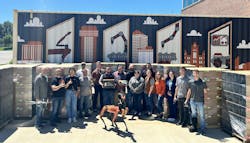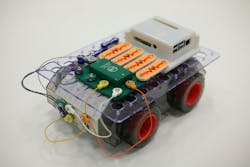Putting Manufacturing, STEM Into the Hands of Middle and High Schoolers
It’s been a resounding workforce message of the past decade: Jobs in STEM fields are growing at a rapid rate, and we aren’t developing enough talent to meet the projected need. According to the Bureau of Labor Statistics, STEM occupations are projected to grow 10.8% between 2022 and 2032, compared to just 2.3% for non-STEM occupations.
A STEM talent deficit would mean trouble for manufacturing. “Our research has identified a very significant future skills gap in the manufacturing space, which are really high potential jobs that exist all across the United States,” says Michael Gretczko, Deloitte’s chief business architect.
To remedy the dilemma, a prominent push for more young people to enter STEM fields is underway. But what is the best strategy to foster enthusiasm for STEM and manufacturing careers? And when is the optimal time to promote these industry jobs to future professionals?
Two initiatives take a direct approach, putting students in the driver’s seat of their own education and creating learning opportunities where they may not exist otherwise.
CoorsTek: The Denver Metro Regional Science and Engineering Fair
Ceramics manufacturer CoorsTek is no stranger to youth education initiatives. From science day tours at its R&D centers, to a mobile learning exhibit, to donations and sponsorships at the college level, the company looks for STEM outreach opportunities all around the world, says CoorsTek CTO Randel Mercer.
When CoorsTek first attended the 2018 Denver Metro Regional Science and Engineering Fair (DMRSEF), not far from its global headquarters in Golden, Colorado, the company was impressed with how well it was run, Mercer says.
Around for over 60 years, the fair is an annual competition that empowers middle and high school students to conduct and present their own research projects. The event is held each February at the University of Colorado Denver.
After attending and volunteering for a few years, CoorsTek became a lead sponsor for the fair in 2020.
“These are multi-year agreements we have with the science fair, and so we hope to continue doing it for many years into the future,” says Mercer, who is part of the DMRSEF Community Advisory Council along with one other CoorsTek team member.
The season-long lead up to the fair day includes more than just robust preparation on the student side; the DMRSEF has a wide program of workshops, Q&A sessions and other events during the preseason, including the opportunity to apply for research funding.
When the day of the fair comes around, CoorsTek’s support can be seen in several areas of the competition.
The company usually has around 20 to 30 people volunteering their time. They participate as official judges, man a hands-on CoorsTek educational exhibit and take part in ‘Speak with a Scientist’ panels, which allow students to ask science and engineering professionals about their career and experiences.
CoorsTek also awards its own special prize to projects that align with the company’s vision statement: “We make the world measurably better.”
“We’re really looking for something that could have a positive impact out in the world,” says Mercer. This year’s winners included a project on low-cost water purification and a project using fungi to degrade plastic waste.
What comes after middle- and high-school STEM? Browse IndustryWeek's brand-new list of trade school and college scholarships for teens and adults interested in manufacturing careers.
Some participants have the chance to move on to other competitions like the Colorado Science and Engineering Fair and the Regeneron International Science and Engineering Fair.
CoorsTek invites winners to take laboratory tours, allowing the students to witness the day-to-day life of scientists and engineers. “They can see what these kinds of careers look like in practice,” he says.
The company’s year-round participation with the fair helps to achieve goals on multiple fronts, including making STEM opportunities more visible to students.
“There’s lucky families such as my own; my daughter can see someone in a science career already, but for a lot of families, it’s not visible at home or in their community.”
Mercer says DMRSEF and similar initiatives also benefit the future of industry itself by creating a much-needed pipeline for manufacturing talent.
“These days you hear a lot about software engineering or non-physical sciences … We just want to make [physical sciences] visible to kids so that they understand that is something they could study in college and they could have a career in,” he says.
Deloitte: Smart Factory Believers Program
With a specific focus on underserved communities, Deloitte’s Smart Factory Believers program delivers math and science curriculum, teacher training, student guides and video modules to Title I-eligible middle and high schools.
But perhaps the most eye-catching element of the program is the Smart Rover kit.
The kits bring educational skills to life through demonstration and experience as opposed to traditional teaching styles. In other words, the materials are showing, not telling, Gretczko says.
Deloitte assembled an ecosystem of partners to bring the kits to life, working with The National Math + Science Initiative, Siemens Digital Industries Software and AWS, among others, to support the creation and delivery of the kits.
Elenco Electronics’ Snap Circuits R/C Snap Rover kit provides the foundation for the resulting Smart Rover kit.
“We’ve added a Smart Factory Believers component to it, which is a Raspberry Pi minicomputer that students can code to do a series of activities or challenges and navigate that rover through those challenges,” he says. The kit is then assembled and shipped from Deloitte’s Smart Factory located on the grounds of Wichita State University.
When the kits reach participating schools, the included curriculum is brought to life through the rover. Students use electrical circuits and coding language to build, power and operate the mobile robot through various challenges. Students also strengthen core skills like problem solving, planning and tactical skills like assembly and following instructions, Gretczko says.
“We believe that hands-on learning in this case is the best way to really make these skills stick and to help drive some excitement with the kids,” he says.
In the last two years, the kits have reached over 11,800 students and teachers in 91 schools, says Gretczko. Initial results show that 70% of students reported they enjoyed hands-on learning, and 60% enjoyed working with technology and programming.
The goal is to drive interest to the intersection of STEM and manufacturing. “The students work in small groups, which very much mimics how lots of work gets done in these factories and in the places where those STEM skills are applied,” says Gretczko. In addition, he compares the process of executing tests and finding and correcting errors to product development and product testing capabilities.
The program’s distribution of kits to areas with diverse socioeconomic, religious and ethnic backgrounds create a path for equity in STEM education.
“Really hard problems are solved by really diverse teams. So, by touching a really diverse set of students, we will improve that pipeline of diversity in that manufacturing talent pipeline and give our manufacturing clients the best possible chance of building the right kind of teams they need,” he says.
Gretczko emphasizes the role teachers play in expanding the potential of the program.
“If you're able to touch one teacher and help them understand the world outside their educational environment, i.e., the business world and what manufacturers are doing, they will have the ability to touch many generations of students,” he says. The “ROI” of investing in just one teacher is extremely impactful “not only for their own careers and being a more STEM-fluent teacher, but in the generations of students that they can then impact beyond that.”
With an increasing demand for STEM professionals, Deloitte is in a privileged position to be a driving force in education equity, says Gretczko.
“We think there’s a win-win. There’s a win for manufacturers who have all these jobs that they’re trying to fill and a win for these underserved communities where students are looking for future career growth,” he says. “We believe we’ve got a responsibility and an opportunity to help inspire students to pursue careers in that space and help fill that gap.”
About the Author
Anna Smith
News Editor
News Editor
LinkedIn: https://www.linkedin.com/in/anna-m-smith/
Bio: Anna Smith joined IndustryWeek in 2021. She handles IW’s daily newsletters and breaking news of interest to the manufacturing industry. Anna was previously an editorial assistant at New Equipment Digest, Material Handling & Logistics and other publications.


